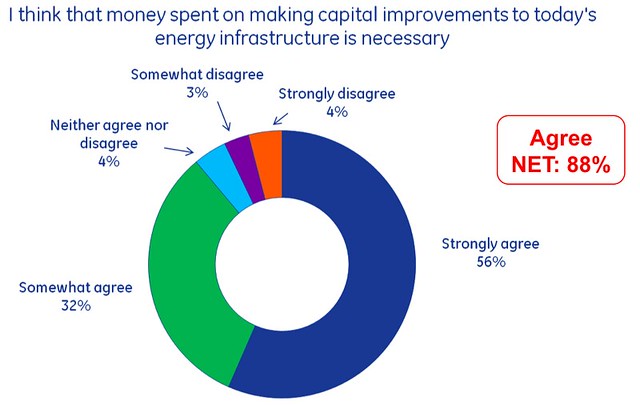GE published a U.S. Consumer Impressions of the Smart Grid [pdf] survey* recently.
I spoke to the general manager of Metering and Sensing Systems for GE?s Digital Energy business, Luke Clemente about the survey and he told me that the main points of the survey were:
- 96% of Americans who are familiar with the smart grid are overwhelmingly positive about the technology and what it will do for the country
- while only 2% thought that smart grid was not a smart investment by utilities and/or consumers
- 80% of U.S. consumers are excited about upgrading the electrical network with smart grid so that their country can rely more on clean domestic energy sources
- 78% think that the smart grid would help reduce the number of power outages and restore power more quickly when outages do occur
- 74% understand that the smart grid will give them the info they need to make better decisions about electricity usage
- 72% think the smart grid will help them save money on their monthly bills
- 63% believe the smart grid will create new jobs in the energy sector
- 66% agree they would buy smart appliances and other in-home devices to maximize their control over energy once smart grid rolls out in their community
In our follow-up conversation Luke said
One of the awareness issues which needs to be driven, is that it does cost more to generate electricity at two o’clock in the afternoon than it does at 2am. To the extent that we can shift our use of energy to less intensive times, that will end up driving better utilisation of the grid and better economics
Luke went on to mention the Department of Energy’s year-long study which showed that consumers, when given information on their electricity consumption, reduced their bills by 10% and reduced peak demand by 15%.
There are three crucial points here –
consumers have quite a positive attitude to Smart Grids
consumers will adjust their behaviour when given information related to their energy use and
that response is good for the grid (and by extension, for its users).
We have seen some instances where utilities failure to communicate effectively with their customers has led to blowback against Smart Meter and Smart Grid projects.
However, as this survey shows, overall consumer sentiment to Smart Grids is positive. Utility companies need to beware that they don’t squander this goodwill – right now it is theirs to lose.
You should follow me on twitter here.
* The survey was conducted in March 2010 by StrategyOne among a census representative sample of 1,000 U.S. consumers via telephone. The margin of error for the sample of U.S. consumers (n=1,000) is + 3.1% at the 95% level of confidence.

